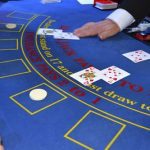
Going from a hobbyist to a professional poker player takes a lot of effort. It requires dedication, discipline, and a solid strategy to ensure you have the best chance to profit consistently from the game. The critical question that many players wrestle with is, “Am I there yet?”
This article will go over what it takes to be considered a professional poker player and the everyday tasks that come with the label. We’ll also look at the characteristics you’d need to develop to be on par with the pros.

What Does Saying You’re a “Professional Poker Player” Mean?
Generally speaking, a “professional poker player” is someone who plays online or live poker primarily for income and not just as a hobby. In other words, you must make money from poker to consider yourself a pro.
This could be in the form of winning tournaments, cashing out at cash games, or even playing for stakes and taking “rakeback” into account, or the amount of money that goes back to players from each pot.
What are the Daily Tasks of a Professional Poker Player?
Professional poker players have to be very dedicated and disciplined to succeed. The following are some of the duties a pro is expected to accomplish.
Studying the Mathematics Behind the Game and Developing Strategies
Professional poker players rely on more than just their intuition and luck. Instead, they devote significant effort to researching the game’s underlying mathematics and designing strategies based on their findings.
Understanding the odds of particular hands and calculating outs and pot odds are essential skills for any serious poker player. Additionally, exploiting specific patterns and tendencies in their opponents’ play can give players a significant edge.
Analyzing Past Games
Analyzing past games is a critical daily task that cannot be neglected. It’s not just about looking for mistakes or missed opportunities but about gaining a deeper understanding of your opponents’ playing styles and tendencies.
Analyzing past games enables players to develop strategies to employ in future games and make informed decisions at the poker table.
Regularly Playing Games With Players of Different Levels
Playing games with players of different levels is not just a daily task for professional poker players. It’s a crucial component of their job. From newcomers to seasoned experts, each player has their own style and approach to the game, requiring professionals to adapt and perfect their techniques constantly.
Poker’s attractiveness stems from unpredictability and the challenge of anticipating your opponent’s every move. And no two players are alike. By being exposed to a broader array of players, professionals gain more significant insights and a more comprehensive understanding of the game.
Managing Bankrolls Responsibly
Professional poker players must excel at accurately managing their bankroll if they hope to succeed in the highly competitive world of high-stakes poker. Unlike beginner players who might play every single hand, professionals must take a more strategic approach.
Poker pros know how much money they can lose before it harms their livelihood and play accordingly. This requires patience, discipline, and a firm grasp of financial management principles.
Without a thoughtful approach to bankroll management, even the best players can find themselves financially in a challenging position. This could lead to them being unable to continue playing at the high levels of competition they have become accustomed to.
Success in professional poker requires discipline and financial acumen in equal measure.
Keeping Up With News About New Tournaments
Keeping up with the latest news about the game, players, and tournaments is essential to maintaining a professional’s edge at the tables. From learning new strategies and trends to staying informed on opponents’ tendencies, dedicating daily time to staying up-to-date can set pro poker players apart from the competition.
Whether reading articles from trusted sources, following industry leaders on social media, or tuning into the latest podcast, being a professional poker player entails consistently seeking new information and insights to improve game skills and strategies.

What are the Characteristics Required to Become a Poker Pro?
As with any profession, a particular set of characteristics and qualities is necessary to become a successful poker pro. Here are the most important qualities:
Dedication:
To be a poker pro, you must be dedicated to everything about the game. The level of commitment you put into studying and practicing your strategies can determine your ability to analyze your opponents, make quick and calculated decisions, and adapt to different playing styles.
Dedication ensures that you put the necessary hours of time and effort into perfecting your craft, never ceasing to learn new techniques and improve upon your weaknesses.
Focused Attention
Poker demands focus and concentration, which means that staying focused and attentive for long periods is a crucial requirement before stepping into the big leagues. However, being focused may be easier said than done.
With the multitude of distractions, whether in onsite locations or online platforms, staying focused must be practiced and developed.
Decision-Making Skills
On any given hand, multiple factors need to be considered when making a decision, such as pot odds, starting hands, position, etc. Professional players must possess the skill of quickly assessing the situation to make educated decisions on how best to proceed each round.
Emotional Resilience
Poker is an incredibly emotionally challenging game. With the wide spectrum of emotions one can experience, from the thrill of winning a big pot to the sting of losing one, professional players must maintain emotional resilience and not become overwhelmed. Poker games can be grueling, and remaining calm and composed is vital for long-term success.
Adaptability
The game of poker is ever-evolving, with new techniques being discovered, opponents’ methods shifting over time, and the stakes rising.
To stay ahead of the competition, professional players must be able to modify their playing style quickly. This means not only staying on top of industry trends but also understanding how different strategies work against different players.
Adjusting your strategy quickly and effectively is essential for any professional poker player.
Self-Discipline
When playing poker, self-discipline is vital because it prevents players from chasing losses or making rash judgments.
Professional players must be able to remain disciplined, stick to their strategy, and take emotions out of the game to achieve long-term success at the table.

Is Turning Pro a Possibility?
Turning pro in poker is a real possibility and a viable option for players dedicated to the game. Countless examples of pros have achieved success, not only financially but also in becoming respected figures in the industry. Conversely, the path to becoming a poker pro is not easy, and it requires hard work, dedication, and the right set of skills.
If you believe you have what it takes to become a professional poker player and are willing to put in the time and effort required to study everything there is to know about the game, turning pro may be a realistic goal.
 Skip to content
Skip to content





